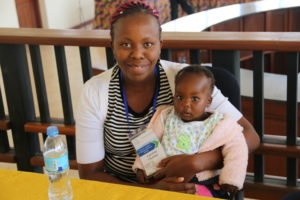11 February 2018
What challenges do women in science with children face? To celebrate the African women in science day, the pan-African research consortium Afrique One-ASPIRE has asked one of its PhD fellows, Caroline Mwihaki Ng’anga- Mburu, about her experience. Caroline is a sociologist based in Nairobi, Kenya. She is married with five daughters: Jebichi (10), Wambui (8), Imora and Kwizera (2) and Nashipai (1). In the first year of her fellowship, she attended two conferences with her nursing baby, Nashipai.
Afrique One-ASPIRE: What is the biggest challenge you face as female scientist?
The biggest challenge that we face as female scientists is balancing family and science (studies/work), as well as getting supervisors who understand our specific needs and are willing to provide an enabling environment. When I went to ask a male supervisor at my university if he could supervise my PHD studies, I had gone to see him with my then three-month-old baby whom I left in the car with my husband. I mentioned to him that I had a baby in the car. The potential supervisor told me to go and look for a female supervisor who would understand my having a baby and the challenges that come with it! On a better note, too, my main supervisor is a lady now and has been very supportive and my other supervisor, a male Professor, has been very helpful, too. Therefore, managing time and being able to travel with a baby and the support that requires are a main challenge that we often face.
Afrique One-ASPIRE: Caroline, in the first year of your fellowship you were required to travel from Nairobi (Kenya) to Arusha (Tanzania). How did you organize yourself with your family?
 Within Afrique One-ASPIRE, I was able to travel with my husband and then five-month-old baby Nashipai for the Brucellosis kick-off meeting in Arusha. That was very supportive and helpful. We left our other daughters with a couple friend in Nairobi. On the other hand, for the summer school, the consortium provided for the airfare, local transport, hotel accommodation and nanny services for me and my baby. That enabled me to be available to participate in the summer school and nurse and care for my baby. The consortium catered for everything my baby and I needed other than obviously the personal necessities.
Within Afrique One-ASPIRE, I was able to travel with my husband and then five-month-old baby Nashipai for the Brucellosis kick-off meeting in Arusha. That was very supportive and helpful. We left our other daughters with a couple friend in Nairobi. On the other hand, for the summer school, the consortium provided for the airfare, local transport, hotel accommodation and nanny services for me and my baby. That enabled me to be available to participate in the summer school and nurse and care for my baby. The consortium catered for everything my baby and I needed other than obviously the personal necessities.
Afrique One-ASPIRE: Any other suggestions how the programme can support you and other women scientists? Where do you see challenges? What solutions do you propose?
My proposal would be that female scientists need to be supported with resources as in the case above to allow them to attend meetings with their nursing babies. Furthermore, as mothers when scheduling meetings the programmes can be arranged in a way that they do not exceed a week as much as possible to allow us not to be away from our families for too long. Additionally, in the case of international meetings, female scientists could be allowed to make their own provisions, e.g. if they would like to bring their kids and nanny along if they so choose and pay for. Of course, this can only be done as long as the kids do not jeopardize their ability to participate fully in the meetings. This is because for most of us, in as much as we want to pursue a career in science, we still believe that our children are our primary responsibility especially in the formative years.
I think that ongoing conversations like this one are useful especially with male colleagues, so that the gaps and challenges we face can continue to be addressed especially because men are still largely the decision makers in institutions and other policy making bodies. I believe that continuous dialogue would be helpful so that more and more women can feel supported and enabled to pursue a career in science even as they take care of their children.
Lastly, I must thank Afrique One-ASPIRE for the support they have demonstrated so far to us female scientists.
Share on: